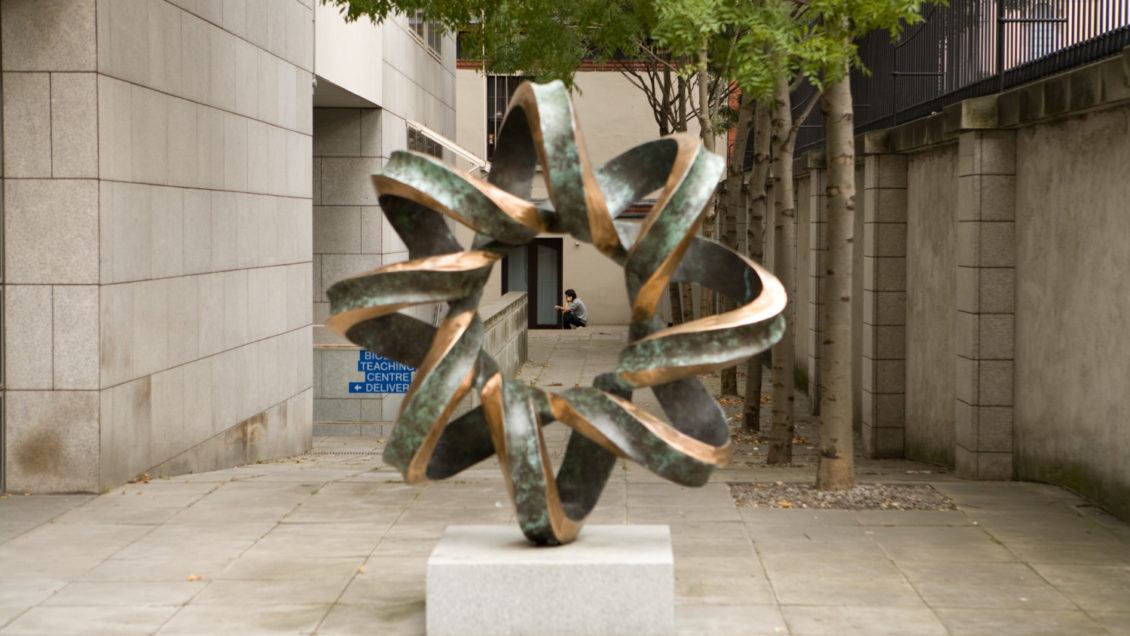
DUBLIN, Ireland – Trinity College Dublin was founded in the late 16th century, but Ireland’s leading university soon will honor a special guest from the United States whose futuristic research on complex genetic traits continues to break new ground in the 21st century.
Trudy Mackay, director of Clemson University’s Center for Human Genetics, is the 2018 recipient of Trinity College’s Dawson Prize in Genetics, which is awarded to geneticists of international prominence. Mackay will spend several days in Dublin in early November to receive her prize, tour the university and city, give a public lecture, and meet with undergraduate and graduate students of the Smurfit Institute of Genetics.
The prize, which will be presented in the form of a gold miniature of the sculpture “The Double Helix” by the late Brian King, was established by a gift from George Dawson (1927-2004), founder of the department of genetics at Trinity College. There have been five previous winners: John Sulston (2006), Mary-Claire King (2010), Corey Goodman (2011), Elliot Meyerowitz (2013) and Vishva Dixit (2016).
Sulston, who died this year, was one of the most influential collaborators of the Human Genome Project and winner of the 2002 Nobel Prize in Physiology or Medicine. King, who was awarded the National Medal of Science by President Barack Obama in 2016, has been instrumental in discoveries that have changed the ways we think about cancer. Goodman, an eclectic scientist, educator and entrepreneur, pioneered genetic analysis in Drosophila, a genus of fruit flies. Meyerowitz, the 2018 recipient of the Gruber Prize in Genetics, has been a champion for openness and collaboration in scientific research and has been successful in making plant DNA available to a huge number of researchers. Dixit, who is vice president for discovery research at Genentech in San Francisco, has conducted pioneering studies defining the biochemical framework of how cells die.

Mackay, whose research has also focused on Drosophila, is recognized as one of the world’s leading authorities on the genetics of complex traits. In addition to being director of the Center for Human Genetics, which is part of Clemson’s College of Science, she is also the Self Family Endowed Chair in Human Genetics. Mackay is a fellow of the National Academy of Sciences, the American Association for the Advancement of Science, the American Academy of Arts and Sciences and the Royal Society of London.
“It is a great honor to receive this prestigious award and to join the outstanding scientists who have previously been awarded the Dawson Prize,” Mackay said. “I am particularly pleased that the selection committee has recognized the pivotal role the Drosophila model system has played in researching complex trait genetics. Future advances in understanding the genetic basis of human disease will increasingly rely on research utilizing comparative genetics and genomics to comprehend the function of the many thousands of variants associated with disease in human populations.”

Mackay will be joined by her husband, Robert Anholt, Provost’s Distinguished Professor of Genetics and Biochemistry and also director of faculty excellence initiatives in the College of Science.
“The Dawson Prize is an enormous honor, which follows the prestigious Wolf Prize, which Trudy received in 2016,” Anholt said. “The Dawson Prize recognizes Trudy’s pioneering work in quantitative genetics, which is fundamental to agriculture, medicine and evolutionary theory, and enhances the international reputation and prestige of Clemson University.”
“The Dawson Prize encompasses George Dawson’s passion for genetics, his recognition that science needs to be shared with the public, and his placement of students at the heart of the genetics department – a tradition that happily continues to this day,” added Aoife McLysaght, professor of genetics at Trinity College. “We are excited to honor the groundbreaking work of Trudy Mackay. Over the course of her distinguished career, Trudy has tackled one of the most difficult and challenging questions in genetics; namely the genetics of complex traits, including behavioral traits and disease risk. Her public lecture will be a special opportunity for people to come and learn about this exciting science from a world-renowned expert.”
END
Clemson University College of Science
The College of Science transcends boundaries and bridges connections across life, physical, and mathematical sciences. Its mission is to pursue excellence in scientific discovery, learning and engagement that is both locally relevant and globally impactful. For more information, visit https://cualumni.clemson.edu/give/science.
Clemson Center for Human Genetics
The mission of the Clemson Center for Human Genetics is to advance and disseminate knowledge of the principles and mechanisms by which genetic and environmental factors affect human health and disease through discovery, education and engagement to benefit the health and well-being of the people of South Carolina, the nation and the world. For more information, visit https://www.clemson.edu/science/research/chg.html.
Trinity College Dublin
As Ireland’s university on the world stage, Trinity is recognized for academic excellence and a transformative student experience. The historic campus is located in the heart of Dublin city centre at the meeting place of the retail and cultural districts. With a tradition of scholarship spanning more than four centuries, Trinity is home to talented and inquiring minds, a liberal education, and research conducted at the frontiers of discipline. For more information, visit https://www.tcd.ie/.
Get in touch and we will connect you with the author or another expert.
Or email us at news@clemson.edu

